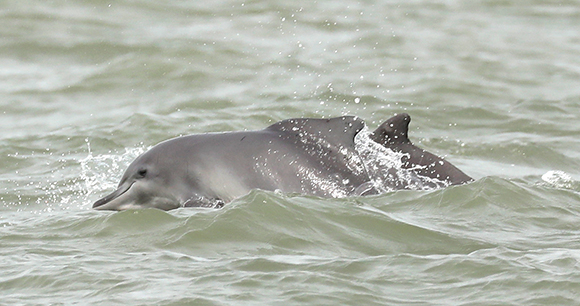
Washington, DC—The National Marine Fisheries Service announced today that the highly imperiled Atlantic humpback dolphin will be protected under the US Endangered Species Act.
Atlantic humpback dolphins are found only along Africa’s western coast. No more than 3,000 likely remain alive. An Endangered Species Act listing prohibits trade in the dolphins, promotes funding for conservation within their range, increases global awareness, and fosters international cooperation and the sharing of scientific expertise. The agency’s decision came in response to a petition filed by the Animal Welfare Institute, Center for Biological Diversity, and VIVA Vaquita.
“We are thrilled that this ESA listing will bring greater attention to the Atlantic humpback dolphin’s dire situation,” said Naomi Rose, Ph.D., senior scientist in marine mammal biology for the Animal Welfare Institute’s Marine Life Program. “Imperiled cetaceans, such as this dolphin, need all hands on deck in order to survive.”
Atlantic humpback dolphins are most threatened by entanglement in fishing nets, but also suffer from coastal development and noise from human activity. The local market for Atlantic humpback dolphin meat also appears to be growing.
“Atlantic humpback dolphins could disappear before most people even know they exist, so Endangered Species Act protections come in the nick of time,” said Catherine Kilduff, a senior attorney at the Center for Biological Diversity. “This is a critical step to saving these adorable, but little-known, dolphins before it’s too late.”
Atlantic humpback dolphins, with distinctive humps on their backs topped by rounded fins, live in shallow waters near the shore. Their range includes the coast of 13 western African countries from Western Sahara south to Angola. They feed on nearshore fish, including mullet. The International Union for Conservation of Nature has declared the dolphin at “an extremely high risk of extinction in the wild.”
“After the vaquita, which is teetering on the edge of extinction, the Atlantic humpback dolphin is the next most endangered species of small marine cetacean, which includes the dolphins and porpoises,” said Thomas Jefferson, Ph.D., an expert on the species. “We hope that this listing will aid in efforts to ward off extinction, and start a phase of recovery for the species.”
Margie Fishman, Animal Welfare Institute
(202) 446-2128, [email protected]
Catherine Kilduff, Center for Biological Diversity
(202) 780-8862, [email protected]
Thomas A. Jefferson, VIVA Vaquita
(858) 945-4240, [email protected]
The Animal Welfare Institute is a nonprofit charitable organization founded in 1951 and dedicated to reducing animal suffering caused by people. AWI engages policymakers, scientists, industry, and the public to achieve better treatment of animals everywhere: in agriculture, in commerce, in our communities, in research, and in the wild. Follow us on Facebook, X (formerly Twitter), and Instagram for updates and other important animal protection news.
The Center for Biological Diversity is a national, nonprofit conservation organization with more than 1.7 million members and online activists dedicated to the protection of endangered species and wild places.
VIVA Vaquita is a coalition of like-minded scientists, educators, and conservationists, who strive to increase the attention given to the vaquita, the world's most endangered marine mammal species. Our goals and mission are to generate awareness of the vaquita and to promote a healthy Upper Gulf of California ecosystem. We conduct research, public awareness, and education activities to bring this about. Ultimately, we aim to help save the vaquita from extinction, and to do so in a way that also provides long-term benefits to the fisherman and other residents who live around the Gulf of California, Mexico.